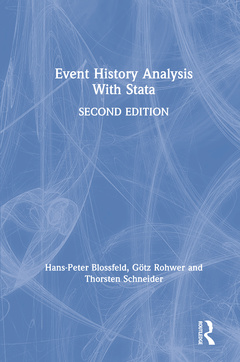Description
Event History Analysis With Stata (2nd Ed.)
2nd Edition
Language: English
Subjects for Event History Analysis With Stata:
Keywords
Transition Rate Models; West Germany; event history analysis; General Labor Force Experience; stata; Time Constant Covariates; nonparametric descriptive methods; Job Exit Rate; exponential transition rate models; Piecewise Constant Exponential Model; piecewise constant exponential models; Time Dependent Covariates; time-dependent covariates; parametric assumptions; Job Episode; semiparamteric transition rate models; Cumulative Incidence Functions; model specification; Log Normal Model; Exponential Model; Event History Data; Log Logistic Model; Labor Force Experience; Data Set; Period Specific Effects; Weibull Model; Episode Splitting; Risk Set; Gompertz Model; Cox Snell Residuals; Cox Model; Product Limit Estimation; Partial Likelihood
Publication date: 04-2019
· 15.2x22.9 cm · Hardback
Publication date: 04-2019
· 15.2x22.9 cm · Paperback
Description
/li>Contents
/li>Readership
/li>Biography
/li>
Nowadays, event history analysis can draw on a well-established set of statistical tools for the description and causal analysis of event history data. The second edition of Event History Analysis with Stata provides an updated introduction to event history modeling, along with many instructive Stata examples.
Using the latest Stata software, each of these practical examples develops a research question, refers to useful substantive background information, gives a short exposition of the underlying statistical concepts, describes the organization of the input data and the application of the statistical Stata procedures, and assists the reader in performing a substantive interpretation of the obtained results. Emphasising the strengths and limitations of event history model techniques in each field of application, this book demonstrates that event history models provide a useful approach with which to uncover causal relationships or to map out a system of causal relations. It demonstrates how long-term processes can be studied and how changing context information on the micro, meso, and macro levels can be integrated easily into a dynamic analysis of longitudinal data.
Event History Analysis with Stata is an invaluable resource for both novice students and researchers who need an introductory textbook and experienced researchers (from sociology, economics, political science, pedagogy, psychology, or demography) who are looking for a practical handbook for their research.
Preface
- Introduction
- Event History Data Structures
- Nonparametric Descriptive Methods
- Exponential Transition Rate Models
- Piecewise Constant Exponential Models
- Exponential Models with Time-Dependent Covariates
- Parametric Models of Time Dependence
- Methods to Check Parametric Assumptions
- Semiparametric Transition Rate Models
- Problems of Model Specification
- Introduction to Sequence Analysis by Brendan Halpin
- Appendix: Exercises
- References
- About the Authors
- Index
Hans-Peter Blossfeld is Professor of Sociology at the University of Bamberg in Germany. He directed the European Research Council (ERC) funded project ‘Education as a Lifelong Process – Comparing Educational Trajectories in Modern Societies’ (eduLIFE) at the European University Institute in Florence, Italy (2012-2016).
Goetz Rohwer is Professor Emeritus of Methods of Social Research and Statistics at the Ruhr-Universität Bochum in Germany.
Thorsten Schneider is Professor of Sociology with a special focus on comparative analysis of contemporary societies at the University of Leipzig in Germany since 2011.




